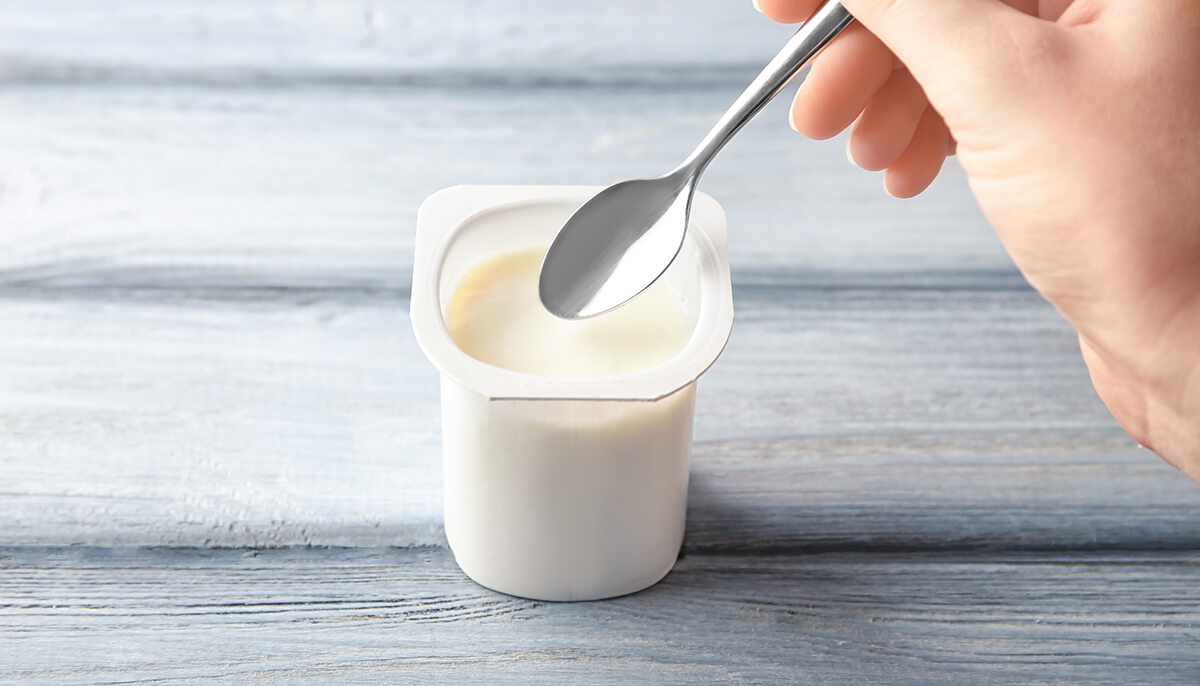Benefits of Probiotics
Exploring the health benefits of probiotic-rich dairy foods.

Probiotics are gaining attention due to emerging research on their health benefits, as well as general interest in functional foods that provide health-enhancing properties beyond their nutrients. As people become more aware of how diet impacts health and disease risk and they seek out foods to meet their specific needs, more probiotic-rich foods are likely to appear on store shelves.
What Are Probiotics?
Probiotics are live microorganisms that have a health benefit when consumed. Trillions of these microorganisms live in the stomach and intestines and make up the gut microbiota, which is considered a key to health. The “good” bacteria in the intestines have a symbiotic relationship with the body, getting energy from the foods people eat and providing health benefits to the entire body.
Not all probiotics are the same, and every person has a unique gut microbiota that responds to probiotics differently. It is important to consume a combination of strains that have been shown to be effective to derive the greatest potential health benefit. Eating a variety of probiotic-rich dairy foods can enhance the good bacteria in the gut, improve health, and reduce disease risk, while also providing important vitamins, minerals and protein.
How Much Is Needed?
The amount needed for health effects varies widely, depending on the species and strain of probiotic and the desired health benefit. Different probiotics are effective at different levels; some products are effective at a level of 50 million live cells per day and others at over one trillion. Yogurt commonly contains between 100 million and 10 billion live probiotics per serving. Follow manufacturers’ recommendations for the levels needed from specific products. Because probiotics do not permanently stay in the intestinal tract, daily consumption of probiotics is generally recommended.
Where Can Probiotics Be Found?
Probiotics come from either supplements or foods. Supplements may contain higher levels of probiotics, yet food sources provide nutritional benefits in addition to probiotics. Probiotic bacteria have long been associated with dairy products because some of the same bacteria that are used in fermented dairy products (yogurt, cheese, kefir and sour cream) also make up the intestinal microbiota.
Dairy products are a desirable probiotic “delivery vehicle” for several reasons:
- Dairy foods can protect probiotic bacteria from high acid levels in the stomach, allowing higher levels of probiotics to reach the intestine.
- Refrigeration of dairy products helps promote the stability of probiotics.
- People are often afraid of bacteria in foods but have a positive perception of the terms “live, active cultures” linked to fermented dairy foods.
Probiotic-containing dairy products have healthy functional-food properties. Probiotics provide an added value to milk products that already have high levels of vitamins, minerals and protein needed for healthy growth and development in children and disease prevention and wellness in adults.
Probiotics and Gastrointestinal Health
Probiotics have been shown to have a positive impact on a variety of gastrointestinal disorders. They are used routinely in the health care setting to reduce diarrhea associated with taking antibiotics in both adults and children. Certain probiotics may help manage symptoms of irritable bowel syndrome and may also inhibit the growth of Helicobacter pylori, bacteria that colonize the stomach and can cause ulcers and stomach cancer.
Probiotics and Lactose Intolerance
People with lactose intolerance can often consume yogurt with few symptoms because of the probiotics it contains. These probiotics help digest the lactose in the small intestine before it reaches the colon. In addition, the yogurt starter cultures Lactobacillus bulgaricus and Streptococcus thermophilus help break down the lactose. Yogurt is a good way for people with lactose intolerance to consume the recommended servings of dairy without experiencing uncomfortable symptoms.
Probiotics and Immunity
A healthy immune system is important for everyone, and probiotics may play a role in improving its function. One study of adults that consumed a yogurt drink with several bacterial strains showed that consumption of the probiotics significantly reduced the incidence of upper respiratory infections and flu-like symptoms. In preschool children, a diet that included daily probiotic consumption led to reduced cold and flu symptoms and a decrease in missed school days due to illness.
Probiotics and Chronic Disease Risk
A growing body of evidence shows that the gut microbiota may play an important role in the development of obesity, obesity-associated inflammation and insulin resistance. Obesity and type 2 diabetes are associated with changes in gut microbiota. Whether or not these changes impact weight or disease risk is the subject of scientific research, but the potential for using probiotics in weight management and disease prevention is positive.
Probiotics and Mental Health
The impact of probiotic consumption on mental health is one of the newer areas of probiotic research. Researchers believe that the link between the gut and the brain, known as the “gut-brain axis,” affects both physical and mental health. Probiotics are being studied for their ability to reduce anxiety, relieve stress and improve mental outlook.
Researchers are just beginning to explore the effect of probiotics on many other aspects of human health. In the meantime, probiotic-rich foods can safely become part of a daily eating pattern, with the potential to have an impact beyond the nutrients
provided.
Are Probiotics and Fermented Foods Healthy?
Kristal Shelden, RDN, elaborates on the nutrition science behind these foods + the impact on health.
Watch here